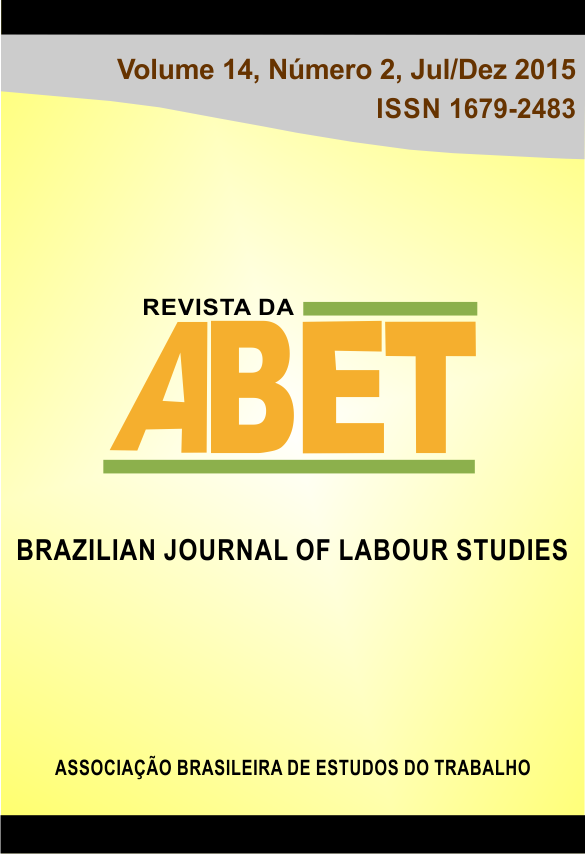THE EVOLUTION OF FORMAL EMPLOYMENT WAGES IN BRAZIL (2003-2013)
Abstract
With the recovery of economic growth in Brazil in the 2000s, the labor market recovered the impulse of growth lost in the 1990s. Between 2003 and 2013, this recovery was marked by growth of formal employment and their wages, so that the level is increased and wage inequality in formal employment decreased. Using data from the Annual Social Information (RAIS) of the Ministry of Labor and Employment (MTE), this article analyzes the evolution of wages that occurred with the strong growth of formal employment that occurred in Brazil. Thus, a classification of occupational categories by average level of wages shows that wage's purchasing power increases were greater as lower were the salary level of occupational categories, suggesting the importance of the minimum wage appreciation policy. The separation of the sub-periods 2003-2007 and 2007-2013, in turn, shows the importance of continuity of the employment growth with low inflation to the increase in wage purchasing power, indicating the relevance of professional categories readjustments for elevation of its level with reduction of the relative dispersion of wages in formal employment.
Downloads
Downloads
Published
How to Cite
Issue
Section
License
Política de Acesso Livre
Esta revista oferece acesso livre imediato ao seu conteúdo, seguindo o princípio de que disponibilizar gratuitamente o conhecimento científico ao público proporciona maior democratização mundial do conhecimento.
Atribuição dos artigos é não comercial (sem derivações 4.0, isto é, Creative Commons) e o acesso é livre e gratuito para download e leitura.
Não há taxa para submissão, avaliação e publicação de artigos.
Copyright
1) Os artigos são de responsabilidade exclusiva dos autores. É permitida sua reprodução, total ou parcial desde que seja citada a fonte.
2) Os trabalhos enviados para publicação devem ser inéditos, não sendo permitida sua apresentação simultânea em outro periódico nacional.
3) Os artigos são submetidos a pareceristas "ad hoc", após prévia avaliação da Comissão Editorial, os quais podem aceitar, recusar ou reapresentar o original ao autor com sugestões para alterações. Os nomes dos pareceristas permanecem em sigilo, bem como os nomes dos autores.
Os Autores que publicam nesta revista concordam com os seguintes termos:
Autores mantêm os direitos autorais e concedem à revista o direito de primeira publicação, com o trabalho simultaneamente licenciado sob a Creative Commons Attribution License, permitindo o compartilhamento do trabalho com reconhecimento da autoria do trabalho e publicação inicial nesta revista.
Autores têm autorização para assumir contratos adicionais separadamente, para distribuição não-exclusiva da versão do trabalho publicada nesta revista (ex.: publicar em repositório institucional ou como capítulo de livro), com reconhecimento de autoria e publicação inicial nesta revista.
Autores têm permissão e são estimulados a publicar e distribuir seu trabalho online (ex.: em repositórios institucionais ou na sua página pessoal), já que isso pode gerar alterações produtivas, bem como aumentar o impacto e a citação do trabalho publicado.
Patrocinador
A publicação recebe financiamento da Associação Brasileira de Estudos do Trabalho.










